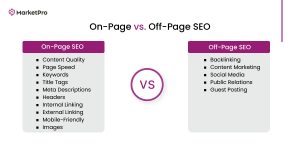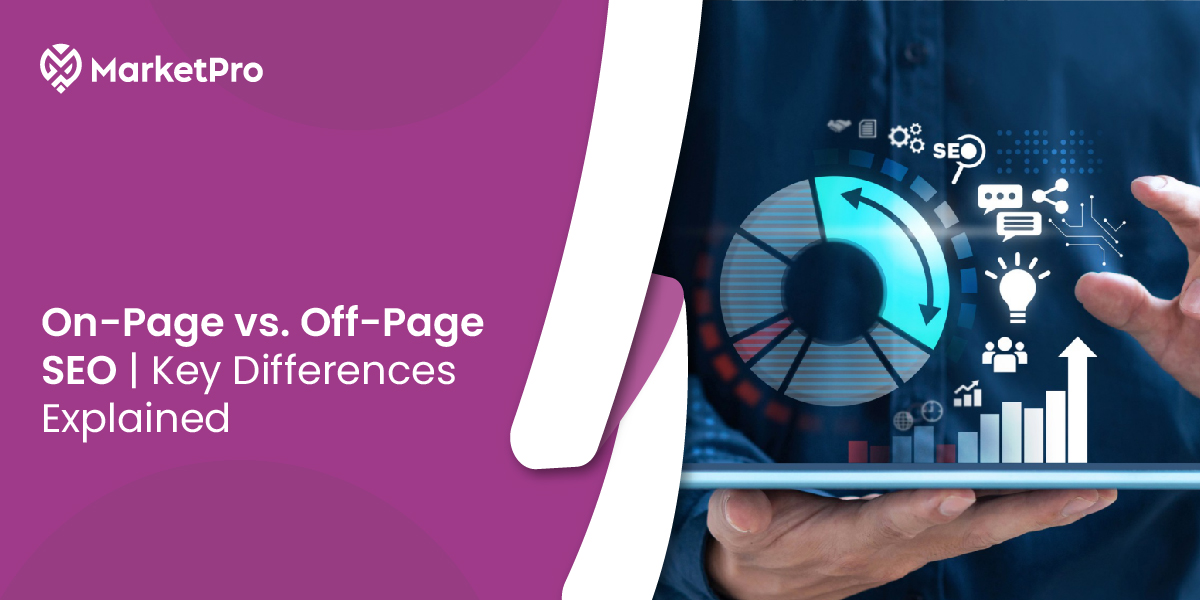With the ever-changing trends of Search Engine Optimization [SEO], businesses need to be active and updated with new rules and algorithms in this field.
Every now or then, a new website builds its presence on search engine platforms but fails to make a considerable impact. Sometimes, the reason comes from mediocre content or the site’s poor functionality, but the faults and breakpoints are hard to assess. This blog will discuss two essential categories of SEO: On-page and off-page.
On-page refers to the content that visitors encounter when they access a webpage.
Off-page refers to materials that contribute to the site’s visibility and reputation but cannot be seen on the web page itself.

This blog will cover the main difference between on-page vs. off-page SEO and determine how their presence builds a strong SEO presence for any brand’s website.
On-Page SEO: Overview and Checklist
Onpage SEO is likely self-explanatory as it caters to all the elements on a website’s page. It’s like the front end of the website, including all the aspects visitors can see.
On-page incorporates all the elements that help them rank on Search Engine Result Pages [SERPs]. These elements often include title tags, headers, image alt texts, page speed, content structure, and keywords.
Organic SEO agencies consider On-page’s integral role in enhancing user experience. Websites with better content structure and readability are also encouraged by search platforms like Google, and they intend to rank those websites that serve valuable expertise.
On-Page SEO Checklist:
The following are some of the most influential factors in improving the on-page experience for their visitors:
Crafting Exceptional Content
Did you know that 52% of consumers acknowledge that blog content influences purchasing decisions?
Writing exceptional content is no longer a topic of debate, as search engines rank websites that possess better content quality and provide their visitors with a unique experience. Search engines no longer show websites that share the same generic content and typical web content writing practices as others and fail to add value to user lives.
On the other hand, how websites structure their content with visually appealing elements and clear sitemaps makes users’ online experience reliable and effortless.
Use Relevant Keywords
Using target keywords cannot be emphasized more, as it helps the site’s presence rank with relevant keywords and phrases.
Optimized blog or page titles with target keywords that show what their page is about and try to make it unique and descriptive with every different web page of a single website. A character length of 60-70 characters for title tags works best for SEO purposes.
But the hunt for optimizing on-page content didn’t end here, and single keyword generation may become more competitive for ranking purposes. That’s where long-tail keywords come in—easy and effective, incorporating them in meta-descriptions and headers H1, H2, and H3… makes search engines easy to crawl and rank their presence.
Concise URL Structure
Concise URL structure makes it easy for search engines to understand what the website is all about. It also eases the jobs of search engine crawlers, as they can index and rank the website accordingly.
Companies should keep URLs short, clear, and concise. They should also incorporate keywords with the proper density and label directories and folders correctly to make sense for users.
Add Image Alt Text
With increased awareness and significance of applying visual elements. Brands are adding infographics and images to enhance their page content experience.
This way, brands need to benefit from their presence by focusing on the critical implementation of adding image alt texts. Crafting image alt texts with direct and descriptive image content that includes optimized keyword phrases and doesn’t exceed the character limit length of 125 characters. This process paves an additional opportunity for brands to get noticed by search engine crawlers.
Improve Page Speed
Google suggests that slow page speed and loading time increase bounce rates, damaging a website’s authority and reputation.

So what does that mean? All efforts to optimize and structure content go to waste in seconds.
There are specific terms that businesses can implement to improve their page speed and loading time:
- Compress image sizes without compromising their quality
- Minimize HTTP requests
- Enable browser caching that erases unnecessary caches on websites
- Minimize the use of redirects
- Prioritize optimizing above-the-fold content first
Implement Mobile-Friendliness
As it’s considered, websites not optimized for mobile have an average 60% bounce rate. This shows the importance of responsive designs of websites that cater to every device screen.
Google also lately emphasized the importance of mobile-friendly websites and even mentioned enhancing and improving their page speed in order to get massive interest across all types of visitors.
Off-Page SEO: Overview and Checklist
Off-page SEO comprises all the activities and efforts done at the back end of their website, which goes beyond their websites.
Off-page SEO is more likely to work behind the scenes to give a website exceptional domain authority and credibility. It involves writing offsite content services and collaborating with other reputable websites, which makes their mutual connection profitable for websites looking to increase their authority and reputation.
Off-Page SEO Checklist:
This blog will cover other aspects of off-page SEO that add considerable value to increasing a website’s credibility below.
Build Backlink Strategies
Backlinking shows Google’s website content quality and its credible presence in the digital realm. The more backlinks websites generate, the better it is for increasing their domain authority.
Backlinks are essential for Google rankings. Google considers both the number and quality of backlinks, assessing their relevance and credibility. This evaluation influences a website’s trustworthiness and search engine position.
It’s advisable to practice guest blogging content services for websites that struggle to build backlinking strategies for their website at the start. Write guest blogs for other reputable websites, prove their expertise, and earn backlinks from their authoritative sources in return.
Leverage The Use of Social Media
Backlinking is not the only sole strategy for businesses to increase their website’s domain authority and reputation. Social media branding adds enormous value for brands looking to improve their site’s visibility and online reputation.
The site links attached to the brand’s social media profiles open excellent opportunities for businesses to tap into a wider audience. On the other hand, the rise of influencer marketing on social media platforms can further strengthen off-page SEO. Companies must actively post and create relevant content on social media platforms and implement content strategy services, as search engines also index social media content in their search results.
Leverage Google My Business Listing
Businesses can improve their off-page SEO approach with Google My Business (GMB).
GMB allows companies to add their business information directly to Google.
It involves adding their name, service area, business hours, contact information, and business URL. On the other hand, regularly listing customer reviews, testimonial images, and FAQs will help Google boost off-page SEO for local businesses, increase their local search, and attract more customer traffic.
Optimize Site’s Visibility with On-Page and Off-Page SEO
There is no need for conversions of onpage vs. off-page SEO factors as both are equally important for increasing a site’s visibility on search engines and social platforms. In contrast, On-page works on producing top-notch content with optimized onsite elements, providing visually appealing and knowledgeable space for visitors. On the other hand, Off-page increases the website’s popularity by improving its domain authority and expertise to rise to the top positions of SERPs. Companies need to implement the instrumental presence of both of these strategies to generate a better impact on their SEO performance.
If you are looking for an agency that caters to both On-page and Off-page aspects of a business’s SEO, then Market Pro is the ultimate solution. Businesses can ace their visibility range with proven search methods that help define their presence on search engine platforms.

